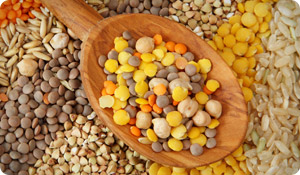
Wouldn't it be nice to have a list of foods that are safe for everyone with allergies to eat? While the concept may sound appealing, in reality, there isn't a "one size fits all" approach to deal with allergens. That is why it's essential to know which foods set off your immune system to help guide your own shopping strategy.
Many Allergy-Free Food Choices Exist
Today, it's easier than ever to find many allergy-free options right on the shelves of your local supermarket. Many health and specialty markets also offer greatly expanded selections as do online retailers, making it possible to eat well with allergies without sacrificing variety and taste.
Allergy-Free Food Options for Wheat and Gluten Allergies
If you're allergic to wheat or gluten, you can shop for pasta, breads, and desserts that are gluten free. Many grocery stores offer these options in the health food section, and you can sometimes find these items mixed in with regular products. Some health food stores and ethnic specialty markets also offer wheat-free and gluten-free grains such as the following:
- Amaranth
- Buckwheat
- Chickpea
- Quinoa
- Teff
Rice is also easily accessible, and often well tolerated. What's more, many of these choices are also high in nutrients.
Allergy-Free Food Options for People Allergic to Dairy
You don't have to forego calcium and jeopardize the health of your bones. Instead, look for dairy-free milk or soy milk in your local health food store. You can also find dairy-free or soy ice creams and even dairy-free mashed potatoes in most food stores. Goat milk and cheeses are other safe alternatives that are also carried by some grocery and health food stores. Or, you can visit a local dairy farm or do a search online to find suppliers in your area.
Allergy-Free Food Options for People with Meat Allergies
For people with allergies to different kinds of common meats, such as beef, turkey, and chicken, you can buy some types of game meat at a butcher shop or through better grocers and specialty markets to get good sources of protein that pose less health risks. Other sources of protein you can find at your local grocers or health food store include whey, legumes, and beans. Before you experiment with any new items, though, always clear it with your doctor first.
Other General Guidelines
When in comes to shopping for allergy-free food options, always look for products that note they're good for people with allergies. While this won't guarantee the foods will be safe for you, it at least gives you a good starting point. You can also shop online at companies that specialize in serving people with specific types of allergies. This can make it easier to find all of the products you seek in one place. However, it does mean you'll need to be organized by replenishing your supply of common foods before you run out.
Keep in mind that if you're in doubt about a product's safety, you should always contact the manufacturer and find out the specifics on how the food was made and double-check about any possible cross-contamination issues.
Sources:
"Eating Out." Food Allergy Initiative. Food Allergy Initiative, n.d. Web. 5 Dec. 2010.
"Foods for Kids with Food Allergies." Kids with Food Allergies. KFA, 28 March 2008. Web. 5 Dec. 2010.
"Food Allergies/For Kids." Kids Health. Nemours, Oct. 2008. Web. 5 Dec. 2010.
"Shopping and Selecting Safe Food." The Food Allergy & Anaphylaxis Network. The Food Allergy & Anaphylaxis Network, 18 Nov. 2009. Web. 5 Dec. 2010.
"What to Eat: How to Survive with Multiple Food Allergies and Eventually Thrive Again." Food Allergy.org. Allergy Adapt, Inc., 2007. Web. 5 Dec. 2010.





